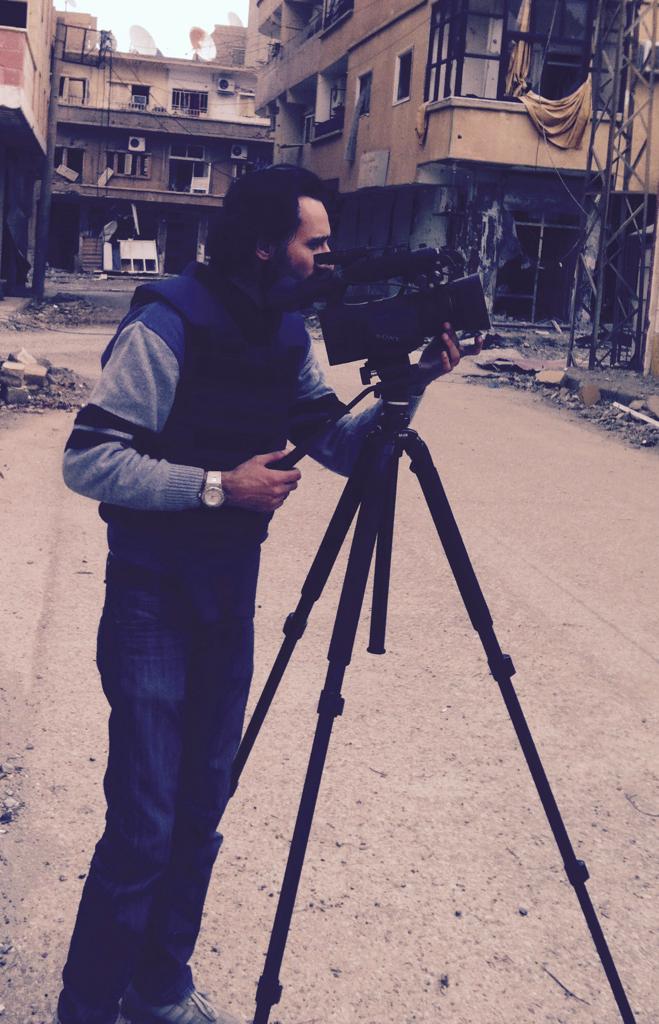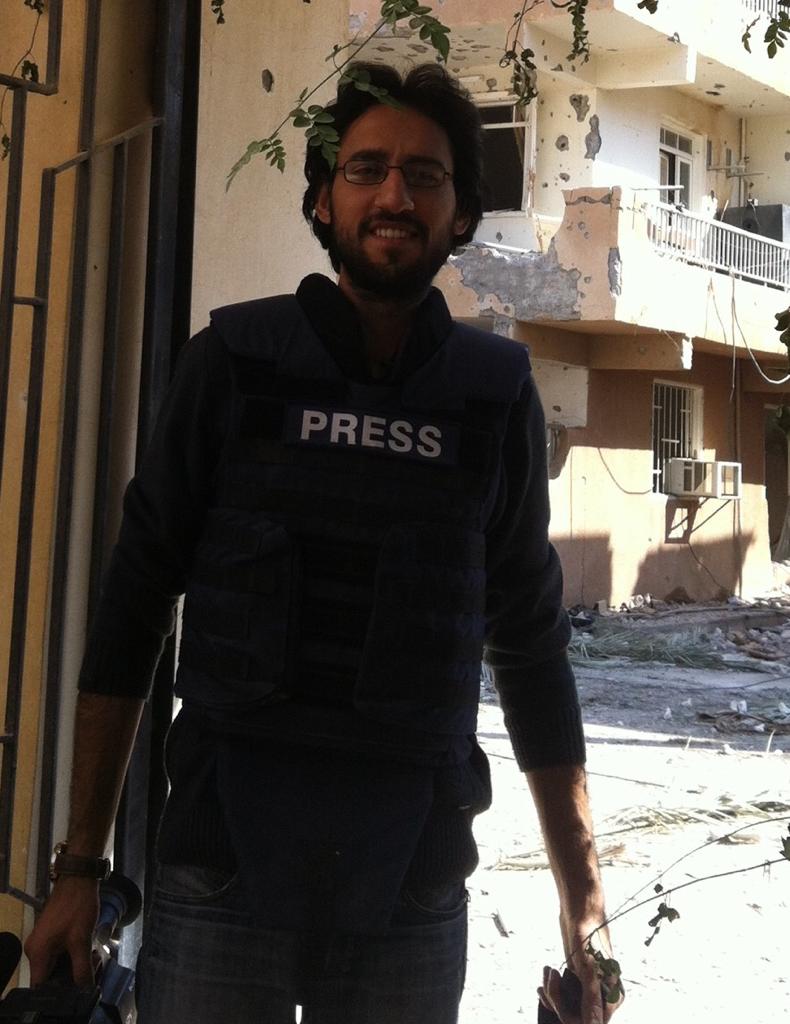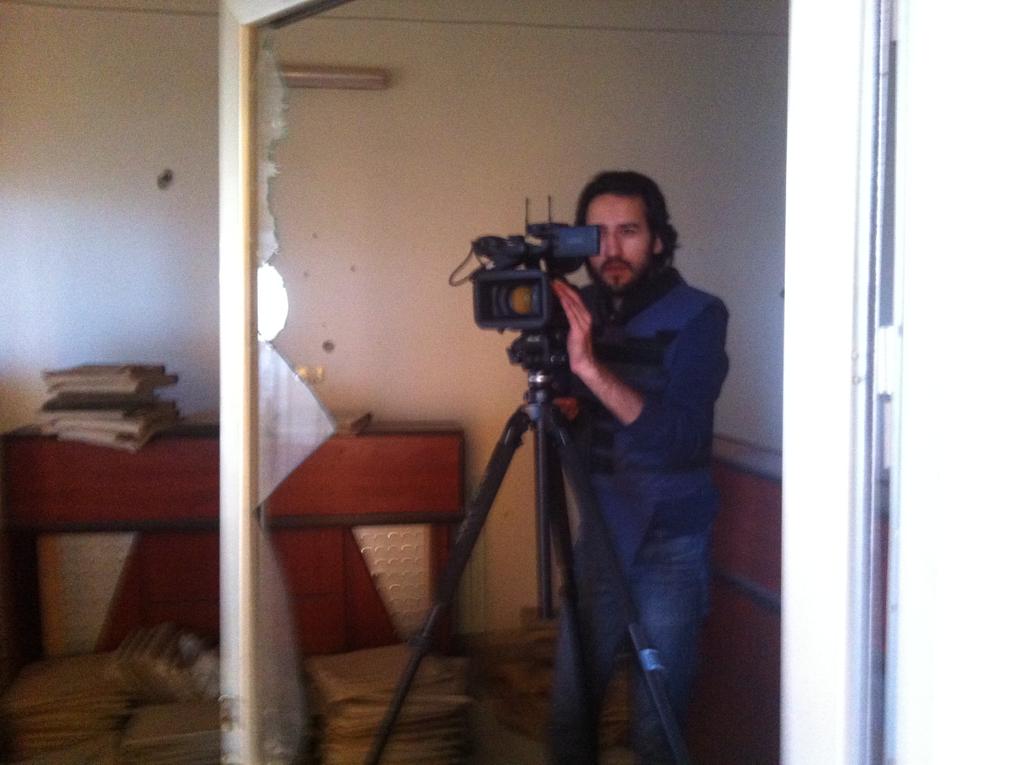لم تحظَ أي حرب في العصر الحديث بتغطية بهذا الحجم الذي تحظى به الحرب الدائرة اليوم في أوكرانيا. اندلعت حروب في بلدان متفرقة في إفريقيا وآسيا، وخاضت أذربيجان وأرمينيا حربا مريرة بين جيشين نظاميين باستخدام أسلحة فتاكة، ودُمّرتقريبا بلد بكامله في سوريا، ومات الآلاف في اليمن بفعل حرب لا تنتهي، دون أن تتصدر أجندة وسائل الإعلام.
باستثناء قلة نادرة من الصحفيين، ظلت الحرب في هذه المناطق في أولويات الصحافة الغربية خاصة مجرد خبر عادي، حتى ولو أدت إلى قتل الآلاف وتشريد الملايين، لكن في أوكرانيا بدأت التغطية حتى قبل أن تُدقّ طبول الحرب.
في سوريا، خاض النظام السوري حربا بكل الأسلحة المحرمة دوليا ضد الثوار بحضور وسائل إعلام قليلة تعضدها رواية النشطاء الصحفيين. والحال أن قناة الجزيرة من بين المنصات القليلة التي حاولت أن تنقل الصورة المأساوية التي تسبَّبَ فيها النظام السوري مدعوما بروسيا. عمر الحاج الذي يغطي الحرب الروسية على أوكرانيا، كان هناك.

التشابه والاختلاف.. بين حربين
غطى عمر الحاج، مراسل الجزيرة بكييف، الحرب في سوريا وفي أذربيجان. وبين هذه التجارب تشابهات واختلافات. أما التشابه، فيراه متمثلا في وجود قوة عسكرية هي روسيا. "في سوريا كان من المستحيل أن تتصرف بحرية في الميدان. احتمال الموت تحت القصف وارد جدا، ومع ذلك فإنك تخاطر أكثر مما تخاطر اليوم في أوكرانيا. لماذا؟ لأنني أنتمي لهذا البلد".
ثمة دائما فجوة بين التنظير للصحافة وبين ممارستها في الميدان. هل يستطيع صحفي سوري مثل عمر الحاج يرى يوميا مئات القتلى والمهجّرين وخراب العمران أن يتجرد من أحاسيسه ومن عواطفه؟ يسرد الحاج أنه حين كان يغطي الحرب هناك "كانت محنة الضحايا بالإضافة إلى الحصول على الأخبار، محور اهتمامي. وأنا الذي حرمت من رؤية والديّ ثماني سنوات وأخي تسع سنوات، لهذا بقيّت هذه المحنة حاضرة في قصصي، وهذا جوهر عملي الصحفي كما أؤمن به".
الاختلافات كثيرة جدا في تغطية الحرب في أوكرانيا وسوريا، بيد أن أهمها هي: "في سوريا كان الصحفي هدفا مشروعا لآلة الحرب الروسية، أما ارتداء سترات الصحفي فيعني بشكل مباشر أنك أضحيت هدفا مشروعا دون أدنى تردد، على العكس من تغطية الحرب في أوكرانيا حيث يحظى الصحفيون بتعامل مختلف "أتكلم معك الآن من فندق تقيم فيه العشرات من البعثات الصحفية، والروس يحاولون ما أمكن تجنب الصحفيين، ثم إنه في أوكرانيا نتوفر على فريق كامل، بينما في سوريا كنت المصور "والفيكسر" والمعد، وأقوم بكل شيء". يفسر الحاج، هذه الازدواجية في المعايير، بالضغط الغربي الشديد الذي تمارسه وسائل الإعلام والمؤسسات الدولية. الحرب في سوريا لم تستقطب وسائل إعلام دولية بسبب المخاطر الكبرى التي يتعرض لها الصحفيون، "باستثناء الجزيرة وبعض النشطاء" لذلك هيمنت رواية واحدة عن الحرب، هي رواية النظام، أما في أوكرانيا فتحضر وسائل الإعلام بقوة، تغطي كل شيء تقريبا، وتنتصر لرواية واحدة أيضا".

سلامة الصحفي أولا
الموازنة بين نقل الواقع على الأرض وحماية الطاقم الصحفي، تخضع لتقييم يومي بين الصحفيين المكلفين بنقل مجريات الحرب، فالأولوية، كما يقول الحاج لسلامة الطاقم قبل كل شيء: "لا يمكن أن يحظى السبق بأهمية أكبر من السلامة الشخصية للطاقم الذي يساهم في التغطية الصحفية، لذلك نحاول دائما قبل الخروج إلى الميدان أن نقرأ تعليمات الجيوش المتحاربة حول المناطق الخطرة التي تدور فيها معارك عنيفة، أو نتابع آخر المستجدات التي تنشرها السلطات، ولا يعني ذلك أننا نتماهى مع روايتها، لكننا نحاول ما أمكن الحفاظ على السلامة الجسدية للطاقم". وفق شهادة عمر فإنهم "يتوفرون على مسعف للتدخل في الحالات العاجلة، وعلينا أن نعي أننا نغطي حربا وليس شيئا آخر".
الرواية الرسمية مهمة لكن..
تطرح إشكالية توظيف المصادر محاذير مهنية كثيرة في مقدمتها كيفية التعامل مع الرواية الرسمية، "في تغطية الحرب الروسية على أوكرانيا نعتمد بالأساس على الروايتين الرسمية للبلدين المتحاربين، غير أن ذلك لا يعني، أننا نسلم بهما أو نتماهى معهما بشكل مطلق".
كيف يمكن أن يعارض الصحفي الرواية الرسمية وسط حالة التعبئة والدعاية التي وصلت مداها أمام تعقّد مسارات الحرب؟ خلال التجارب التي راكمها عمر الحاج في تغطية الحروب، تصبح "العين المجردة" الدليل الذي لا يمكن أن يرقى إليه الشك، حيث تشكّل التغطية الميدانية والاحتكاك بشهود العيان وبالآليات العسكرية بعدا مختلفا عن الرواية الرسمية التي تميل أثناء الحروب إلى توظيف البروباغندا. يستدل بالأرقام التي تنشرها وزارة الدفاع الأوكرانية حول مقتل ما يقارب 12 ألف عسكري، التي تبدو بعين صحفي عاش الحروب قابلة للتشكيك لكن في التغطيات المباشرة يجب أن تخضع للتنسيب، أي إسنادها إلى مصدر رسمي.
يحكي عمر الحاج أن الرواية الرسمية الأوكرانية أكدت أكثر من مرة أن الجيش الروسي لم يدخل إلى مدينة "بوغدونيكيفا"، بيد "أنه خلال زيارتي بدا لي أن الواقع يتعارض مع هذه الرواية. لم أقلها بشكل واضح في التغطية المباشرة للجزيرة، واكتفيت بالقول "نحن على مشارف المدينة بوجود دبابات روسية".
وسط حالة التوتر والتحشيد بين الروايتين، تصبح عملية توظيف مصادر تناقض الرواية الرسمية صعبة جدا لسبب أساسي، برؤية عمر: "لا ننسى أننا في حالة حرب، ومزاج الأنظمة يتسم بالعدوانية، وكل معلومة تذكرها توضع تحت مجهر التقييم، وبالتالي فنحن حريصون بمعية "الفيكسر" على تجنب البروباغندا بالدرجة الأولى، ثم تجنب السقوط في تبني الرواية الرسمية كما هي لأنها تعمد في الحروب إلى المبالغة".

"أزمة" مصطلحات
منذ انطلاق الحرب في أوكرانيا، انقسمت وسائل الإعلام حول استخدام المصطلحات، إما بدوافع سياسية قومية أو معايير تحريرية، فاستُخدِم "الغزو الروسي"، "الأزمة الأوكرانية"، "الصراع الروسي الأوكراني"، "العدوان الروسي" للدلالة على الخط التحريري لوسائل الإعلام المغطية للحرب.
"من اليوم الأول كانت الجزيرة واضحة في قضية تحديد المصطلحات المستخدمة من طرف المراسلين، ولو تلاحظون، فإننا نستعمل "الحرب الروسية على أوكرانيا"، ويمكن للجميع أن يلاحظ، أيضا" كيف أن الجزيرة تفردت بتغطية مهنية وموضوعية، لدرجة أن بعض المصادر تفضل قنواتنا على باقي وسائل الإعلام الأخرى، لأننا حريصون على ضمان التوازن بين جميع الأطراف دون الانحياز العاطفي أو إملاء تحريري. ما يهمنا قبل كل شيء هو نقل الحقيقة أما الصراعات السياسية _خاصة بين الشرق والغرب_ فإننا نتعامل معها بشكل مهني صرف".
هذا الالتزام الحرفي بالمصطلحات التي يحددها الخط التحريري، قد تكون موضع نقاش داخل غرف الأخبار، "فإذا كان الأمر يتعلق بمجزرة حضرها الصحفي ورأى تداعياتها وعاش آثارها على الناس، يجب أن توصف كما هي، والصحفي عليه أن ينحاز للحقيقة في نهاية المطاف".
يمكن تفسير أزمة استعمال المصطلحات في بعض الأحيان بمدى قدرة الصحفيين على فهم السياق السياسي والثقافي لـ "الحرب الروسية على أوكرانيا". لم يأتِ الحاج إلى أوكرانيا دون أن يتوفر على معرفة مسبقة بجغرافيا البلد وتقاليده ولغته وقوميته: " قبل أن أصل لكييف قرأت تاريخ البلد، وتاريخ الاتحاد السوفياتي، وقارنت بين الجيوش، وعرفت لغات البلد وثقافاته والصراعات التي تنشأ بين اللغتين الأوكرانية والروسية، واقتصاد أوكرانيا والأسلحة التي تتوفر عليها، هذه معلومات حيوية لأي صحفي يريد أن يقدم تغطية مهنية متوازنة"
جاء عمر الحاج من سوريا محملا بذكريات استهداف الصحفيين، وسياسة الأرض المحروقة التي انتهجتها روسيا في مواجهة المطالبين بالديمقراطية والعدالة، ليجد أن التعامل مختلف لحد ما هذه المرة رغم استهداف بعض الصحفيين.. هذه هي التناقضات التي سجلها صحفي عاش بين حربين.


















![Palestinian journalists attempt to connect to the internet using their phones in Rafah on the southern Gaza Strip. [Said Khatib/AFP]](/sites/default/files/ajr/2025/34962UB-highres-1705225575%20Large.jpeg)





















